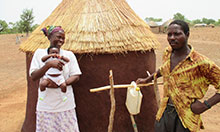Improved Sanitation Leads to Better Nutrition in Yiziidug, Ghana

Simple Tools with a Big Impact
Today all 85 houses in the Yiziidug community in Ghana’s Garu-Tempane District have the tools they need to practice good sanitation and hygiene: household latrines and simple handwashing devices known as “tippy taps.” But this was not always the case. In 2015, before members of the Yiziidug community built sanitation facilities, open defecation under trees and on farmlands was commonplace. Most community members practiced subsistence farming and animal husbandry, but the presence of human feces made it nearly impossible to grow vegetables around homes or in neighboring fields.
Because of SPRING’s interventions, my husband and I have been able to grow beans, berra, and alefu alongside our maize farm because nobody defecates on the farm anymore.
--Laar Kosua, a female farmer in Yiziigug Community in Garu-Tempane district
The WASH 1,000 Approach
Identifying a need for better hygiene in Yiziidug, in 2016, SPRING/Ghana introduced community-led total sanitation (CLTS) to Yiziidug. Endorsed by the Government of Ghana, this internationally accepted approach helps communities eliminate the unhygienic practice of open defecation by influencing social norms to achieve open defecation-free (ODF) status.

SPRING includes CLTS as part of its WASH 1,000 approach, which promotes water, sanitation, and hygiene (WASH) behaviors in households with pregnant and lactating women and children under 2. The first 1,000 days between pregnancy and a child’s second birthday is a critical window of growth requiring proper nutrition and hygiene to prevent stunting, which continues to be a public health challenge in Ghana. Improper sanitation and hygiene can lead to exposure to fecal pathogens, causing diarrhea over long periods of time and impairing the body’s ability to absorb nutrients, which plays a central role in stunting.
The four key behaviors promoted by SPRING’s WASH 1,000 program are—
- boiling drinking water for children 6 to 24 months
- handwashing with soap or ash at critical times, including before eating or preparing food
- ensuring that play spaces for children are free of human and animal feces
- safely disposing adult and child feces in a latrine.
As part of the CLTS effort, Environmental Health Officers from the Ministry of Local Government visited communities to explain how open defecation contributes to transmission of fecal pathogens that cause diarrheal disease. SPRING also trained five natural leaders—community members committed to promoting WASH activities—and nine water and sanitation management committee members to lead the crusade against open defecation, support latrine construction, and sustain gains made in sanitation.
Driven by their enhanced knowledge, the natural leaders and committee members supported the Environmental Health Officers in guiding community members to build latrines and tippy taps for 126 households in Yiziidug and conducted home visits to encourage WASH 1,000 behaviors. Only five months after the program began, the community was declared open defecation-free.
The Benefits of a Clean Environment
One community member who has enthusiastically embraced Yiziidug's new sanitation practices is Laar Kosua, a farmer and mother of six. She and her family now have access to clean farmland because of SPRING’s WASH 1,000 intervention. “My husband and I were always disturbed by open defecation, and this discouraged us from farming, so we committed ourselves to help achieve a clean environment,” she said. “We constructed latrines and also encouraged our neighbors to do same. My family now enjoys bean leaf, okro (local name for okra), and berra soup from our farm. Before this, we bought these vegetables from the market for about 20 GHC ($5) weekly. Now we can save that money and spend it on other investments. I look forward to harvesting my beans on the maize farm in the next few weeks, part of which will be sold, and the rest consumed by the family.”
Like Kosua, most families in Yiziidug cultivate beans, okro, berra, and other legumes, along with maize and millet. SPRING’s WASH 1,000 actions, along with the increased diversity in the diets of women and children in the community are key ingredients to improve the overall nutrition status of Yiziidug's next generation.
Since 2015, SPRING has introduced WASH 1,000 in all 405 of the communities in which the project works in Ghana, and 151 communities have been declared ODF.
